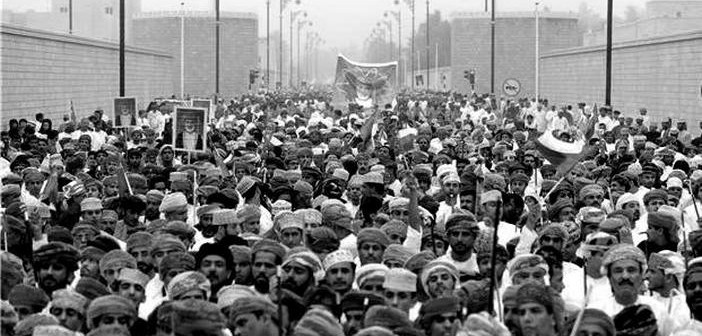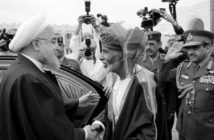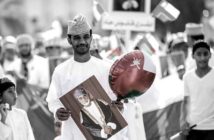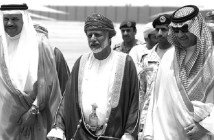On 23 March 2014, Oman’s Sultan Qaboos finally arrived home from Germany after eight months of medical treatment. To say that the news was greeted in the country with spontaneous elation would be an understatement. Immediately after the “heart” of the Omani state was reconnected with the “body” of the nation– Omani citizens started celebrating in a way that shows just how keenly his absence had been felt. Many observers classify Sultan Qaboos as the most popular ruler in the world, an assessment that seems justified in view of the public reaction to his return. Marches, parades and convoys of vehicles loaded to the brim, and adorned with flags and images of Qaboos, abounded for days after his arrival. Of course, it is not unusual to see mass public displays of (often orchestrated) admiration for leaders in this part of the world. In Oman, the difference is that the sentiment is very real. This is clearly reflected in the daily lives of ordinary Omanis. For example, a quick survey of the of Omanis’ social media accounts will show most of them are voluntarily placing a picture of His Majesty with a few heartfelt words of adoration in their profiles. This kind of devotion for political leaders is becoming a rarity in the modern world, especially in the contemporary Middle East.
In the eight months that Sultan Qaboos was in Germany he did not stop working. On this issue Yousef bin Alawi, Oman’s minster of foreign affairs said in a recent interview: “His majesty kept sending us letters about different issues written with his own hand writing.” After giving thanks to Allah for his improved health and for his safe return to the country he thanked the citizens for their warm and lovely welcoming he received when his “legs touched the earth of Oman”. Then the Sultan returned immediately to challenges facing the state.
The Sultan’s return coincided with important events inside the country and in the surrounding environment. On 8 of April 2015, the Sultan presided over a meeting of the council of ministers – the first that he’d attended for many months. The agenda centred on three critical issues: Yemen, Iran and oil prices. The timing of the Sultans’ return to the centre of Oman’s regional balancing role was possibly coincidental; however, it came only days after the start of the Saudi led campaign against the Houthis in Yemen. It also coincided with Iran’s final round of discussions and agreement with the 5+1 group about its nuclear program. Furthermore, the meeting was followed by a first ever visit by all the council of ministers (Oman’s executive body) to the Petroleum Development of Oman company (PDO), the company responsible for more than 55 per cent of Oman’s oil production.
Oman’s government has applied a consistent policy in regional affairs since the 1970s – to be as far as possible from the places that are spotted with blood without turning its back on pressing issues. Despite the interconnectedness of Oman with Yemen, Saudi Arabia and other big players of the Al-Hazim Storm Operation, Oman has maintained its approach of not participating or supporting either party in the conflict. Oman’s primary concern at present is assisting with the growing humanitarian crisis. Injured Yemeni civilians are being treated in Oman’s hospitals (Including Sultan Qaboos University hospital in Muscat). Other than this and despite that most of the strikes are happening in the south of Yemen, some Yemenis have started fleeing the violence into Oman (or to the north of Yemen as a probable step to move to Oman.) In the near future, the global community is expecting – and hoping – Oman can play a positive diplomatic role in solving this dangerous escalation.
On the other side of Omani borders, Iranians are celebrating their agreement with 5+1 over Iran’s nuclear power projects. The region and the world are expecting a commitment from Iran then a removal of the western sanctions. The agreement was reached after very long discussions that were starting on 2012 secretly in Muscat the capital of Oman and continued in more than 10 rounds in places such as Vienna, Geneva and Lausanne. After the agreement was signed, the most two influential players in the discussions – John Kerry and Mohammed Javad Zarif – expressed their deep thanks to the Sultanate for its important rule in the discussions.
Besides enhancing its reputation as a neutral international arbiter, Oman will be positively and negatively affected by the removal of the Iranian sanctions. On the positive side, Iran is planning to invest heavily in different projects in Oman, such as the Al-Duqm special economic area (a project exploiting Oman’s access to the Indian Ocean, expected to increase the logistical importance of the sultanate among Gulf countries). These investments may increase after the expected unfreezing billions of Iranian assets in western banks, which are around 80 billions according to some sources. On the other side, there may be negatives, such as the downward effect on oil prices. Iran is expected to increase its exports of oil – has a potential to increase one million bpd – so the supply of oil will increase in a market that is already over supplied with one and-a-half million bpd. Some political-economy analysts are recommending the government show caution toward the large Iranian investments, concerned about Iranian influence in Oman’s domestic economy.
Finally, some speculators are suggesting that the bridging role played by Oman will draw (as it already is) the Iranian and Saudi interests into a geographic convergence in Oman. Iran is already investing heavily in Al-Duqm Area, and Saudi Arabia is already investing heavily in the Gulf train project (a rail network that will connect all the Gulf countries). The success of Al-Duqm area is to a large extent dependent on the success of the rail project and vice-versa. In other words, the success of a project that Iran is heavily investing in is highly dependent on the success of a project Saudi Arabia is heavily investing in!
Oman’s oil-dependent economy gives oil companies special importance. Raoul Restucci the general manager of PDO told the Omani government ministers that the company planned to play a key role in assisting Oman in key strategic areas, including: educating, training and employing Omanis. According Restucci, “PDO will offer seven thousand jobs during 2015 and it has supplied more than 40 thousands since 2011”. Moving to concerns about low oil prices, the meeting insisted that the oil prices would not hugely harm the economy, reminding: “It’s not the first time prices went down.” Of course, maintaining public confidence in Oman’s economy is of strategic importance for political decision makers.
The huge amount of instability in the surrounding environment and the low oil prices raises concerns of the Omani government and public. However, most Omanis seem to retain faith in the government to maintain a peaceful situation despite surrounding instability.
The return of Sultan Qaboos to his land has been very timely.
by Leon GOLDSMITH and Omran Mohammed Zahran al-ABRI





